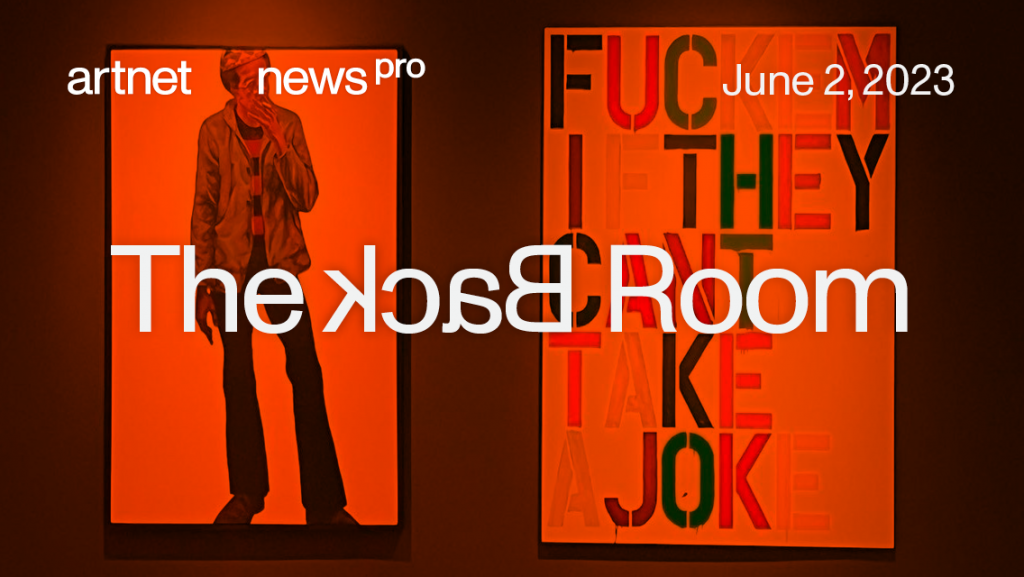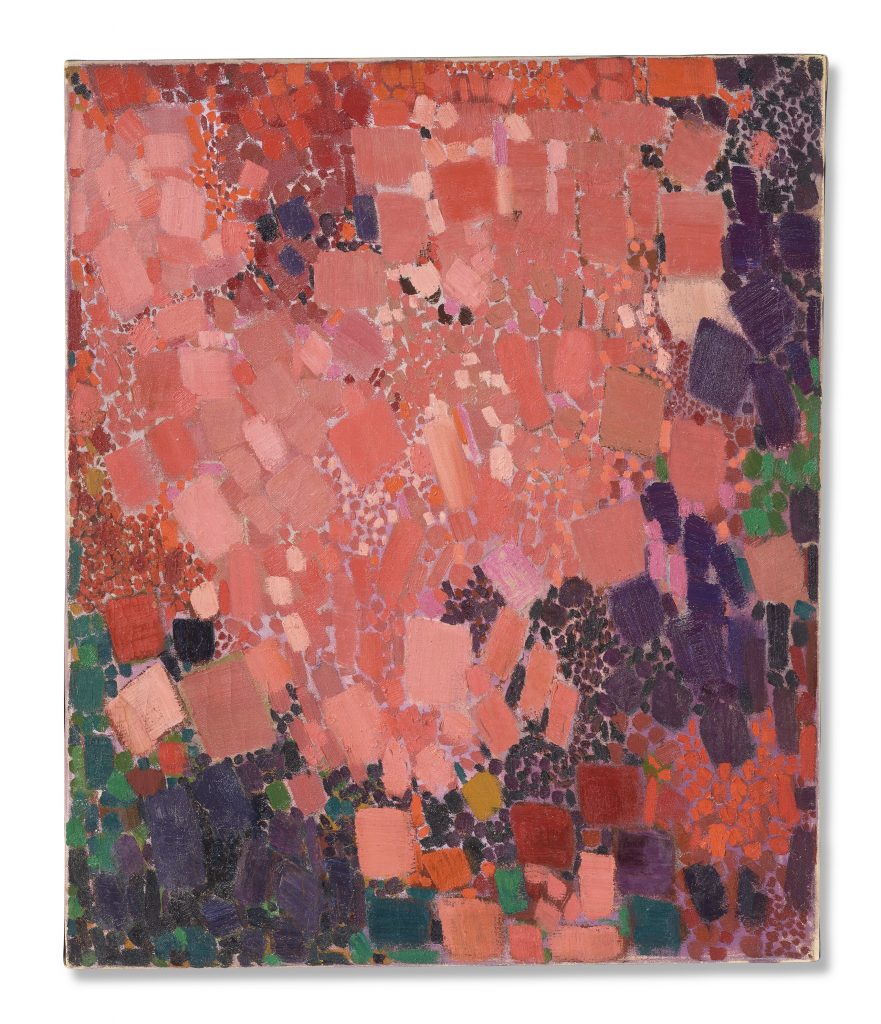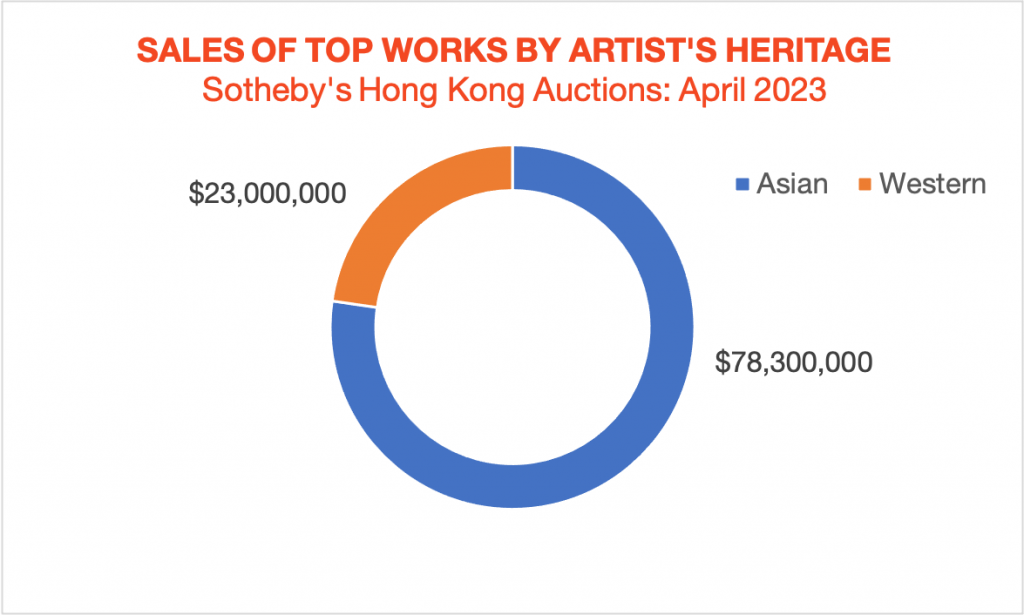The Back Room
The Back Room: The Fineberg Flop
This week, a postmortem of spring's most pivotal (and disappointing) sale, a buzzy new project space on Henry Street, and much more.

This week, a postmortem of spring's most pivotal (and disappointing) sale, a buzzy new project space on Henry Street, and much more.

Artnet News

Every Friday, Artnet News Pro members get exclusive access to the Back Room, our lively recap funneling only the week’s must-know intel into a nimble read you’ll actually enjoy.
This week in the Back Room: an autopsy of spring’s most pivotal sale, a Henry Street gallery surprise, another modern master under the misconduct microscope, and much more—all in a 7-minute read (2,056 words).
_____________________________

Lynne Drexler, Summer Blossom (1962). Courtesy of Christie’s Images, Ltd.
To take a guarantee, or not to take a guarantee? That is the question, or so it seems, in the aftermath of Christie’s evening sale of the Gerald Fineberg collection.
In last week’s Art Detective, our colleague Katya Kazakina performed a full post-mortem on the pivotal auction, which ended with a hammer total of $124.7 million against an estimate of $163 million to $235 million.
In examining just where the Fineberg heirs erred, here’s what went wrong—and what we can learn from it in this new phase of the business cycle…
Confident to a Fault
Eschewing a guarantee that sources said topped $200 million, the estate instead pushed hard to secure what Katya calls “an aggressive enhanced-hammer deal,” by which it would share a big chunk of Christie’s buyer’s premium. Yet that amount totaled only about $37.4 million after the dedicated Fineberg evening and day sales in New York.
And “aggressive” is indeed the operative term. With no guarantees or irrevocable bids, lot after lot sold for less—sometimes far less—than the presale estimates set months earlier.
While the estate and Christie’s agreed to lower reserve prices mid-sale, the former stood firm on refusing third-party guarantees. The result? Several buyers scored bargains on blue-chip artists while the heirs swung and missed.
In fairness, the estate’s full payout is still accumulating. More lots from the Fineberg collection were offered in Christie’s Hong Kong auctions at the end of May, and still more will appear in the house’s New York design sale in June and other, yet-to-be-announced events, according to Christie’s.
Yet it’s hard to imagine the final accounting looking favorable compared to the juicy guarantee that Fineberg’s descendants turned down to roll the dice.
Misreading Seller Psychology
On its face, an auction house that agrees to share the upside with a consignor is an auction house that saves a healthy heap of cash. But that reading underestimates the demotivating effect an enhanced hammer deal can have on auction house employees.
With their extensive labor and up-front cost in putting together a sale, including logistics and financial outlays for little stuff like packing, shipping, installing, and insuring hundreds of works, staffers at every level might be left feeling undervalued by such an arrangement.
That could mean less effort made to make sure every component of the auction excels. No one would blame staffers for this… except for the sellers.
As one executive at a rival auction house explained, “Working for two percent is, theoretically, not that exciting.” The Fineberg heirs might have learned this lesson the hard way.
Over-marketed But Underwhelming
Christie’s went overboard to play up Fineberg’s eye as a curator in the lead up to the auctions, creating a narrative that, as one observer told Katya, made it sound “like it’s the Mona Lisa coming for sale.”
But that tack backfired. In reality, some dealers who worked with Fineberg knew him as more of a haggler than a visionary. He often preferred decent works at a discount rather than bravura works for a price.
Plus, advisor (or “wheeler-dealer,” depending on your perspective) Michael Black was perhaps the most prominent force behind Fineberg’s choices. And while the collection spanned a century, many of those choices were only made during the last three to four years.
___________________________________________________________
While the estimates in the Fineberg sales were out of step with the quick-changing market, many of the worst mistakes could have been avoided with a little humility and an embrace of all the tools at the sellers’ disposal.
Yet even the screaming bargains in the Fineberg evening sale underscored art’s resilience as an asset class. Smart investors love nothing more than to pounce on a short-term deal for something with long-term value.
Some other works, including some that Black advised Fineberg on, also did incredibly well in Christie’s day sale. Grace Hartigan’s On Orchard Street (1957), purchased in 2019, fetched $1.2 million, 12 times the low estimate of $100,000. Lee Krasner’s 1975 untitled oil-on-paper, also acquired in 2019, sold for $1.2 million, more than twice the low estimate of $500,000. And Lynn Drexler’s Summer Blossom, which brought $1.4 million in the day sale against a low estimate of $150,000, was a true highlight among all the lots sold this spring—as well as one of the last pieces Fineberg ever bought.
These bidding wars proved that, even in a correction, there is still strong demand for the right works at the right prices. In that sense, the overarching takeaway from the Fineberg auction might be as simple as… don’t be greedy.
The auction houses, for all their opacity and occasional grandstanding, are performing a valuable service. Sometimes, the wisest move is to bite the bullet, pay up, and actually listen to their advice.
_________________________________________________________
The latest Wet Paint tracks what appears to be Jack Pierson’s new gallery space on Henry Street, and gets into the funny story of how Allan Schwartzman’s advisory firm got its phone number mixed up with a popular uptown lunch spot…
Here’s what else made a mark around the industry since last Friday morning…
Art Fairs and Gallery Weekends
Auction Houses
Galleries
Institutions
Tech and Legal News
_________________________________________________________
“He was fascinated with Hitler. As a child, he pushed his friend from a 15-foot bridge and ate cherries while they were injured.”
—@That_Art_History_Girl via TikTok, leading the Gen Z charge to cancel Salvador Dalí. (Artnet News)
____________________________________________________________

© 2023 Artnet Worldwide Corporation
Whether you slice the list by value or by volume, most of the 15 priciest artworks sold by gavel this April changed hands in the back-to-back evening auctions at Sotheby’s Hong Kong. The sales marked the house’s 50th anniversary in Asia.
According to Alex Branczik, senior director and chairman of modern and contemporary art for Asia at Sotheby’s, no lots by Western artists were included in the evening sales commemorating the house’s 40th anniversary in the region in 2013.
Ten years later, the equivalent auctions showed just how much tastes have changed…
This sales split is a useful reminder of the state of play in Hong Kong, if not the larger Asia Pacific: global taste has most definitely taken hold, but a strong preference remains for artists with roots in the region.
—Tim Schneider
________________________________________________________